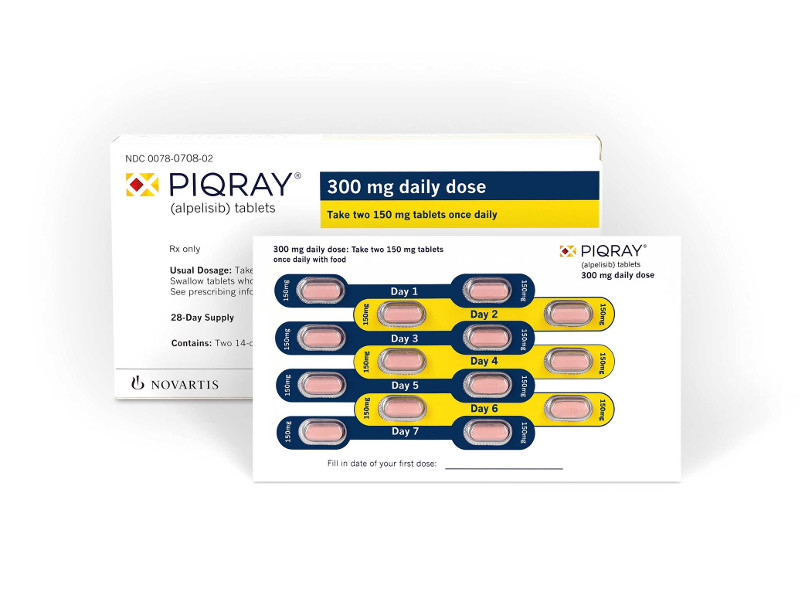Xeloda () vs Piqray (alpelisib)
Xeloda () vs Piqray (alpelisib)
Xeloda (capecitabine) is an oral chemotherapy medication that is typically used to treat breast, colorectal, and gastric cancers by interfering with the DNA synthesis of cancer cells, causing them to die. Piqray (alpelisib), on the other hand, is a targeted therapy known as a PI3K inhibitor used specifically for the treatment of hormone receptor-positive, HER2-negative, PIK3CA-mutated, advanced or metastatic breast cancer, often in combination with fulvestrant. The choice between Xeloda and Piqray would depend on the specific type of cancer, its molecular characteristics, and the patient's overall health profile, which a healthcare provider would evaluate to determine the most appropriate treatment plan.
Difference between Xeloda and Piqray
| Metric | Xeloda () | Piqray (alpelisib) |
|---|---|---|
| Generic name | Capecitabine | Alpelisib |
| Indications | Colorectal cancer, metastatic breast cancer, gastric cancer | Advanced or metastatic breast cancer with a PIK3CA mutation |
| Mechanism of action | Antimetabolite, thymidine phosphorylase activation | PI3K inhibitor, targets the PIK3CA gene mutation |
| Brand names | Xeloda | Piqray |
| Administrative route | Oral | Oral |
| Side effects | Hand-foot syndrome, diarrhea, nausea, vomiting, fatigue | Hyperglycemia, rash, diarrhea, nausea, fatigue |
| Contraindications | Severe renal impairment, known hypersensitivity to capecitabine | Severe hypersensitivity to alpelisib, severe renal impairment |
| Drug class | Antimetabolite, Fluoropyrimidine | PI3K inhibitor, kinase inhibitor |
| Manufacturer | Roche | Novartis |
Efficacy
Xeloda (Capecitabine) in Breast Cancer Treatment
Xeloda, also known by its generic name capecitabine, is an oral chemotherapy medication that is often used in the treatment of breast cancer. It is a prodrug that is metabolized in the body to 5-fluorouracil (5-FU), a substance that inhibits DNA synthesis and thus has anti-cancer effects. Xeloda is particularly effective in the treatment of metastatic breast cancer, especially in patients who have not responded well to other chemotherapy treatments. Clinical studies have shown that Xeloda can significantly improve survival rates and reduce the risk of cancer progression in patients with metastatic breast cancer when used either as monotherapy or in combination with other drugs.
Piqray (Alpelisib) in Breast Cancer Treatment
Piqray, with the active ingredient alpelisib, is a newer medication that is used to treat breast cancer in a specific subset of patients. It is a PI3K inhibitor that targets the PIK3CA mutation, which is found in approximately 40% of hormone receptor-positive, HER2-negative advanced or metastatic breast cancers. Piqray is used in combination with fulvestrant, an estrogen receptor antagonist, and is indicated for postmenopausal women, and men, with hormone receptor-positive, HER2-negative, PIK3CA-mutated, advanced or metastatic breast cancer following progression on or after an endocrine-based regimen. Clinical trials have demonstrated that Piqray, when used in combination with fulvestrant, significantly extends progression-free survival compared to fulvestrant alone in this patient population.
Comparative Efficacy in Breast Cancer Management
The efficacy of Xeloda and Piqray in breast cancer management is context-dependent, with each drug serving distinct patient populations based on the cancer's characteristics and previous treatment responses. Xeloda is often used in a broader range of breast cancer cases, including as a first-line treatment for metastatic disease or after failure of anthracycline and taxane chemotherapy. On the other hand, Piqray's use is more targeted, focusing on patients with a specific genetic mutation (PIK3CA) that can be identified through molecular testing. As such, the efficacy of Piqray is contingent upon the presence of this mutation and is therefore not a universal treatment option for all breast cancer patients.
Conclusion on Efficacy
Both Xeloda and Piqray have shown efficacy in improving outcomes for breast cancer patients, but their applicability and the extent of their benefits vary based on individual patient factors and the molecular profile of the tumor. Xeloda offers a well-established option for a wide range of patients, particularly those with metastatic disease, while Piqray provides a targeted approach for those with the PIK3CA mutation. As with any cancer treatment, the choice of therapy should be individualized and based on a comprehensive evaluation of the patient's specific type of breast cancer, genetic makeup, and overall health status.
Regulatory Agency Approvals
Xeloda
-
European Medical Agency (EMA), European Union

-
Food and Drug Administration (FDA), USA

Piqray
-
European Medical Agency (EMA), European Union

-
Food and Drug Administration (FDA), USA

Access Xeloda or Piqray today
If Xeloda or Piqray are not approved or available in your country (e.g. due to supply issues), you can access them via Everyone.org.
How it works

Make an enquiry
Choose the medicine you want to buy, answer a couple of questions, and upload your prescription to speed things up. We’ll get back to you within 24 hours.


Make an enquiry
Choose the medicine you want to buy, answer a couple of questions, and upload your prescription to speed things up. We’ll get back to you within 24 hours.


Breeze through the paperwork
We'll guide you through the required documents for importing unapproved medicine, ensuring you have all the necessary information.


Get a personalized quote
We’ll prepare a quote for you, including medicine costs and any shipping, administrative, or import fees that may apply.


Receive your medicine
Accept the quote and we’ll handle the rest - sourcing and safely delivering your medicine.

Some text on this page has been automatically generated. Speak to your physician before you start a new treatment or medication.
Let's talk
If you have any questions, call us or send us a message through WhatsApp or email:
Contact us




